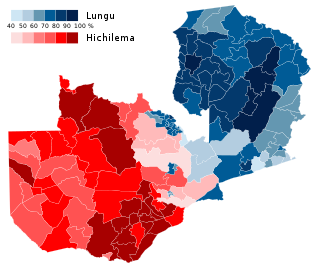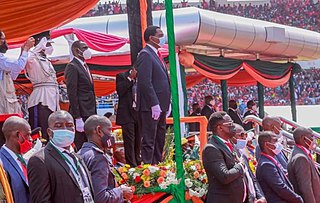
The politics of Zambia takes place in a framework of a presidential representative democratic republic, whereby the president of Zambia is head of state, head of government and leader of a multi-party system. Executive power is exercised by the government, while legislative power is vested in both the government and parliament. Formerly Northern Rhodesia, Zambia became a republic immediately upon attaining independence in October 1964.

The president of the Republic of Zambia is the head of state and head of government of Zambia and is the highest executive authority in the country. The president is elected by popular vote for a five-year term and is responsible for the administration of the government, overseeing the implementation of national policies, and representing Zambia in international affairs. The office was established at Zambia's independence in 1964. The current president is Hakainde Hichilema, who assumed office on August 24, 2021, following the 2021 presidential election where his party, the United Party for National Development, won a majority. The president's role includes appointing the Cabinet, serving as Commander-in-Chief of the Zambian Defence Force, and ensuring the enforcement of laws.

The United Party for National Development (UPND) is a prominent political party in Zambia, founded in December 1998 by Anderson Mazoka, a former executive of the Anglo American Corporation. The party emerged as a significant opposition force following a split from the Movement for Multi-Party Democracy (MMD). The UPND positions itself as a centrist party with strong ideological commitments to social and economic liberalism, advocating for policies that support free-market principles, human rights, and democratic governance.

Elections in Zambia take place within the framework of a multi-party democracy and a presidential system. The President and National Assembly are simultaneously elected for five-year terms.

The Patriotic Front (PF) is a political party in Zambia, founded in 2001 by Michael Sata. It emerged as a breakaway party from the Movement for Multiparty Democracy (MMD) after Sata was not selected as the MMD's presidential candidate for the 2001 elections. The PF is primarily supported by the youth and the urban poor, and it gained significant political influence over time.

Hakainde Hichilema is a Zambian businessman, farmer, and politician who is the seventh and current president of Zambia since 24 August 2021. After having contested five previous elections in 2006, 2008, 2011, 2015 and 2016, he won the 2021 presidential election with 59.02% of the vote. He has led the United Party for National Development since 2006 following the death of the party founder Anderson Mazoka.

Presidential elections were held in Zambia on 30 October 2008 following the death of the incumbent President Levy Mwanawasa on 19 August 2008, as the elections had to be called within 90 days of his death. It was expected that there would be internal problems within the ruling Movement for Multi-Party Democracy (MMD) as Mwanawasa had not declared a successor prior to his death, but Acting President Rupiah Banda was selected as the MMD's candidate without apparent problems. Michael Sata stood as the candidate of the Patriotic Front (PF), while Hakainde Hichilema stood as the candidate of the United Party for National Development (UPND). Godfrey Miyanda stood as the candidate of the Heritage Party.

General elections were held in Zambia on 20 September 2011, electing a President and members of the National Assembly. Michael Sata of the Patriotic Front (PF) won the presidential elections, defeating incumbent Rupiah Banda of the Movement for Multi-Party Democracy (MMD), and was sworn into office on 23 September. The PF emerged as the largest party in the National Assembly, winning 60 of the 148 seats decided on election day.

Presidential elections were held in Zambia on 20 January 2015 to elect a president to serve the remainder of the term of President Michael Sata, following his death on 28 October 2014.

General elections were held in Zambia on 11 August 2016 to elect the President and National Assembly. A constitutional referendum was held alongside the elections, with proposals to amend the bill of rights and Article 79.

Christine Kaseba is a Zambian physician, surgeon and politician who served as the First Lady of Zambia from September 2011 until her husband's death in October 2014. She is the widow of former President Michael Sata, who died in office on October 28, 2014. Kaseba made an unsuccessful bid for President of Zambia in the January 2015 special presidential election to succeed her husband. She was appointed Zambian Ambassador to France on April 16, 2018.

Edgar Chagwa Lungu is a Zambian politician who served as the sixth president of Zambia from 26 January 2015 to 24 August 2021. Under President Michael Sata, Lungu served as Minister of Justice and Minister of Defence. Following Sata's death in October 2014, Lungu was adopted as the candidate of the Patriotic Front in a Convention of the Patriotic Front in Kabwe, for the January 2015 presidential by-election, which was to determine who would serve out the remainder of Sata's term. In the election, he narrowly defeated opposition candidate Hakainde Hichilema and took office on 25 January 2015.

Miles Bwalya Sampa is a Zambian politician, currently serving as Member of Parliament for Matero Constituency and president of the Patriotic Front. The veteran politician previously served as Mayor of Lusaka, having been elected in August 2018. His election in 2021 would see him return to Parliament representing Matero Constituency, a position he served from 2011 to 2016.

Irene Chirwa Mambilima was the Chief Justice of Zambia from 2015 until her death in 2021. She also served as Chairperson of the Electoral Commission of Zambia and presided over the 2006 and 2011 general elections and the January 2015 presidential by-election. She was part of several election observer missions including in Liberia, Kenya, Mozambique, and Seychelles. Her other international assignments included serving as Sessional Judge of the Supreme Court of The Gambia in 2003. Mambilima sat on the International Board of the International Association of Women Judges (IAWJ) as a Director of the Africa Region. She was also a member of several professional associations including the Zambia Association of Women Judges, the Editorial Board Council of Law Reporting, the Child Fund (Zambia), Women in Law Southern Africa, and the Council of the Institution of Advanced Legal Education.

The inauguration of Edgar Lungu as the 6th president of Zambia took place on 13 September 2016. This was the second time Edgar Lungu took the oath after he first took office on 25 January 2015. Edgar Lungu took the oath alongside Inonge Wina as Vice-President of Zambia. The day of the inauguration was set as a public holiday in Zambia and Monday September 12 as a half working day.

Felix Chipota Mutati is a Zambian politician and leader of the Movement for Democratic Change (MDC) party. He is also a member of the UPND Alliance. As a member of the alliance, he was nominated as a Member of Parliament (MP) and was appointed as the Minister of Technology and Science on 17 September 2021 by President Hakainde Hichilema.

Likando Kalaluka, State Counsel, is a Zambian legal practitioner who served as Attorney General under the government headed by President Edgar Lungu. He is a lawyer and advocate of the High Court for Zambia. Kalaluka is currently serving as the Zambia Institute of Advanced Legal Education (ZIALE) board chairman. As Attorney General, Kalaluka was an assistant cabinet member and assistant legal adviser to the Zambian Government.
Events in the year 2021 in Zambia.

The inauguration of Hakainde Hichilema as the 7th president of Zambia was held on 24 August 2021. President-elect Hichilema won by a landslide with over 996,000 votes between him and the Incumbent president Edgar Lungu who got 1,814, 201 votes in the August 2021 presidential election. Hakainde Hichilema took the oath alongside Mutale Nalumango as the Vice-president of Zambia. The venue for the inauguration was National Heroes Stadium in Lusaka. Attendance was supposed to be restricted to invited guests only due to the Covid-19 preventive protocols, but was later made open to the public resulting in a filled out stadium The day of the inauguration was declared a public holiday in Zambia by president Edgar Lungu.

Edgar Lungu's eligibility to contest the 2026 elections elections became a landmark legal issue, culminating in a pivotal ruling by the Constitutional Court. Lungu, who served as Zambia's sixth President from January 2015 to August 2021, assumed office following the death of President Michael Sata. After winning the 2015 presidential election and securing re-election in 2016, he was defeated by Hakainde Hichilema in the 2021 general election. The controversy surrounding his eligibility centered on whether his partial term from 2015 should count towards the constitutional two-term limit. In its final judgment, the Constitutional Court ruled Lungu ineligible to contest the 2026 elections, acknowledging previous legal errors in interpreting his eligibility during the 2021 elections. This decision made a significant moment in Zambia's judicial and political history, sparking national debate about constitutional clarity, judicial accountability, and electoral integrity.
























